
Question Number 211943 by Frix last updated on 25/Sep/24
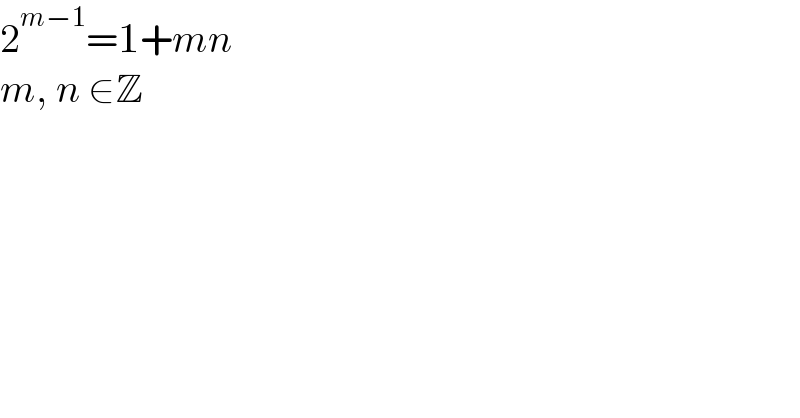
$$\mathrm{2}^{{m}−\mathrm{1}} =\mathrm{1}+{mn} \\ $$$${m},\:{n}\:\in\mathbb{Z} \\ $$
Commented by BHOOPENDRA last updated on 25/Sep/24
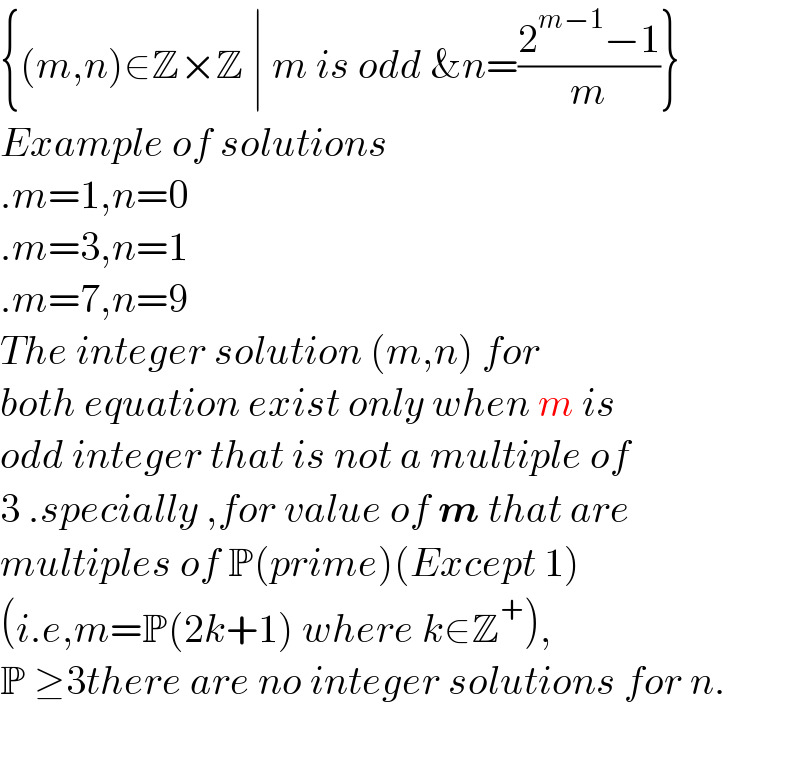
$$\left\{\left({m},{n}\right)\in\mathbb{Z}×\mathbb{Z}\:\mid\:{m}\:{is}\:{odd}\:\&{n}=\frac{\mathrm{2}^{{m}−\mathrm{1}} −\mathrm{1}}{{m}}\right\} \\ $$$${Example}\:{of}\:{solutions} \\ $$$$.{m}=\mathrm{1},{n}=\mathrm{0} \\ $$$$.{m}=\mathrm{3},{n}=\mathrm{1} \\ $$$$.{m}=\mathrm{7},{n}=\mathrm{9} \\ $$$${The}\:{integer}\:{solution}\:\left({m},{n}\right)\:{for} \\ $$$${both}\:{equation}\:{exist}\:{only}\:{when}\:{m}\:{is}\: \\ $$$${odd}\:{integer}\:{that}\:{is}\:{not}\:{a}\:{multiple}\:{of} \\ $$$$\mathrm{3}\:.{specially}\:,{for}\:{value}\:{of}\:\boldsymbol{{m}}\:{that}\:{are} \\ $$$${multiples}\:{of}\:\mathbb{P}\left({prime}\right)\left({Except}\:\mathrm{1}\right) \\ $$$$\left({i}.{e},{m}=\mathbb{P}\left(\mathrm{2}{k}+\mathrm{1}\right)\:{where}\:{k}\in\mathbb{Z}^{+} \right), \\ $$$$\mathbb{P}\:\geq\mathrm{3}{there}\:{are}\:{no}\:{integer}\:{solutions}\:{for}\:{n}. \\ $$$$ \\ $$
Answered by BHOOPENDRA last updated on 25/Sep/24
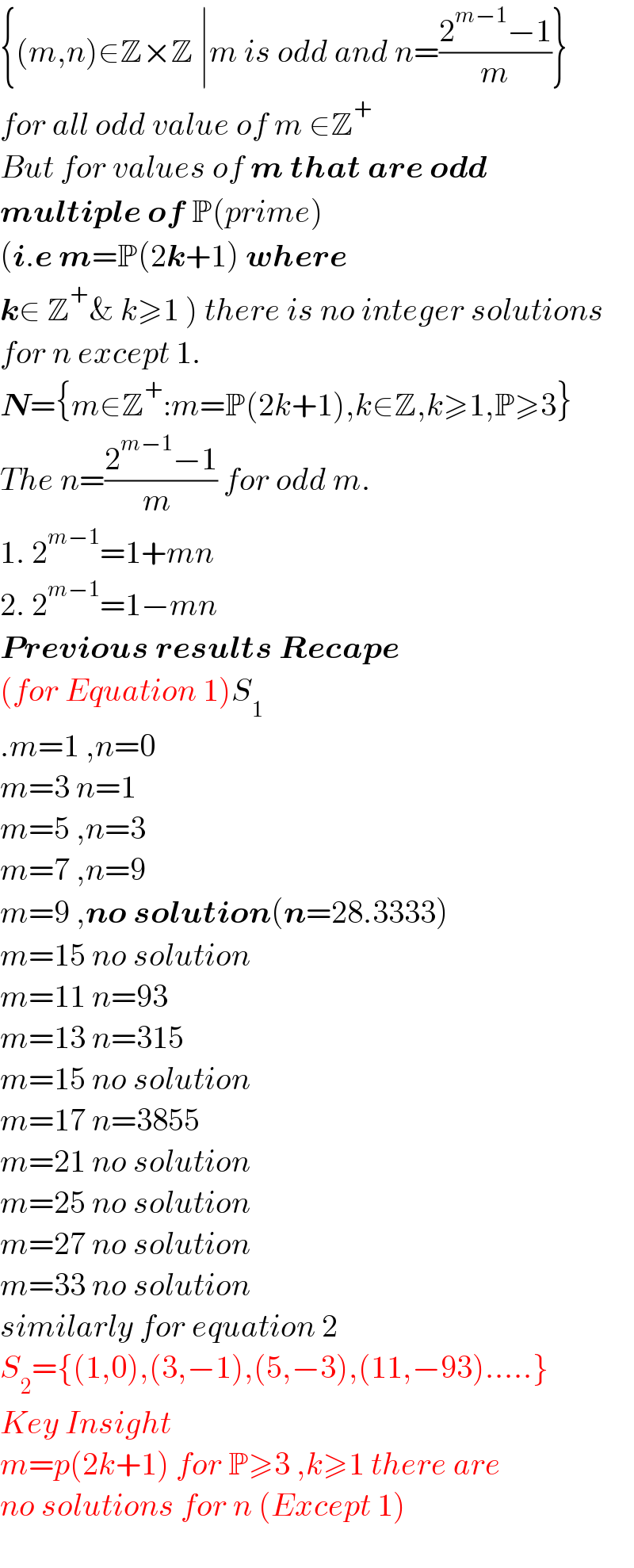
$$\left\{\left({m},{n}\right)\in\mathbb{Z}×\mathbb{Z}\:\mid{m}\:{is}\:{odd}\:{and}\:{n}=\frac{\mathrm{2}^{{m}−\mathrm{1}} −\mathrm{1}}{{m}}\right\} \\ $$$${for}\:{all}\:{odd}\:{value}\:{of}\:{m}\:\in\mathbb{Z}^{+} \\ $$$${But}\:{for}\:{values}\:{of}\:\boldsymbol{{m}}\:\boldsymbol{{that}}\:\boldsymbol{{are}}\:\boldsymbol{{odd}} \\ $$$$\boldsymbol{{multiple}}\:\boldsymbol{{of}}\:\mathbb{P}\left({prime}\right) \\ $$$$\left(\boldsymbol{{i}}.\boldsymbol{{e}}\:\boldsymbol{{m}}=\mathbb{P}\left(\mathrm{2}\boldsymbol{{k}}+\mathrm{1}\right)\:\boldsymbol{{where}}\right. \\ $$$$\left.\boldsymbol{{k}}\in\:\mathbb{Z}^{+} \&\:{k}\geqslant\mathrm{1}\:\right)\:{there}\:{is}\:{no}\:{integer}\:{solutions}\: \\ $$$${for}\:{n}\:{except}\:\mathrm{1}. \\ $$$$\boldsymbol{{N}}=\left\{{m}\in\mathbb{Z}^{+} :{m}=\mathbb{P}\left(\mathrm{2}{k}+\mathrm{1}\right),{k}\in\mathbb{Z},{k}\geqslant\mathrm{1},\mathbb{P}\geqslant\mathrm{3}\right\} \\ $$$${The}\:{n}=\frac{\mathrm{2}^{{m}−\mathrm{1}} −\mathrm{1}}{{m}\:}\:{for}\:{odd}\:{m}. \\ $$$$\mathrm{1}.\:\mathrm{2}^{{m}−\mathrm{1}} =\mathrm{1}+{mn} \\ $$$$\mathrm{2}.\:\mathrm{2}^{{m}−\mathrm{1}} =\mathrm{1}−{mn} \\ $$$$\boldsymbol{{Previous}}\:\boldsymbol{{results}}\:\boldsymbol{{Recape}} \\ $$$$\left({for}\:{Equation}\:\mathrm{1}\right){S}_{\mathrm{1}} \\ $$$$.{m}=\mathrm{1}\:,{n}=\mathrm{0} \\ $$$${m}=\mathrm{3}\:{n}=\mathrm{1} \\ $$$${m}=\mathrm{5}\:,{n}=\mathrm{3} \\ $$$${m}=\mathrm{7}\:,{n}=\mathrm{9} \\ $$$${m}=\mathrm{9}\:,\boldsymbol{{no}}\:\boldsymbol{{solution}}\left(\boldsymbol{{n}}=\mathrm{28}.\mathrm{3333}\right) \\ $$$${m}=\mathrm{15}\:{no}\:{solution}\: \\ $$$${m}=\mathrm{11}\:{n}=\mathrm{93} \\ $$$${m}=\mathrm{13}\:{n}=\mathrm{315} \\ $$$${m}=\mathrm{15}\:{no}\:{solution} \\ $$$${m}=\mathrm{17}\:{n}=\mathrm{3855} \\ $$$${m}=\mathrm{21}\:{no}\:{solution}\: \\ $$$${m}=\mathrm{25}\:{no}\:{solution} \\ $$$${m}=\mathrm{27}\:{no}\:{solution}\: \\ $$$${m}=\mathrm{33}\:{no}\:{solution}\: \\ $$$${similarly}\:{for}\:{equation}\:\mathrm{2} \\ $$$${S}_{\mathrm{2}} =\left\{\left(\mathrm{1},\mathrm{0}\right),\left(\mathrm{3},−\mathrm{1}\right),\left(\mathrm{5},−\mathrm{3}\right),\left(\mathrm{11},−\mathrm{93}\right).....\right\} \\ $$$${Key}\:{Insight} \\ $$$${m}={p}\left(\mathrm{2}{k}+\mathrm{1}\right)\:{for}\:\mathbb{P}\geqslant\mathrm{3}\:,{k}\geqslant\mathrm{1}\:{there}\:{are} \\ $$$${no}\:{solutions}\:{for}\:{n}\:\left({Except}\:\mathrm{1}\right) \\ $$$$ \\ $$
Commented by Frix last updated on 25/Sep/24

$${m}=\mathrm{9}\:\Rightarrow\:{n}=\frac{\mathrm{85}}{\mathrm{3}} \\ $$$$\mathrm{Check}\:\mathrm{it}\:\mathrm{again}! \\ $$
Commented by Frix last updated on 25/Sep/24

$$\mathrm{I}\:\mathrm{first}\:\mathrm{thought}\:\mathrm{I}\:\mathrm{made}\:\mathrm{a}\:\mathrm{mistake}\:\mathrm{because} \\ $$$$\mathrm{you}\:\mathrm{got}\:\mathrm{all}\:\mathrm{odd}\:{m}...\:\mathrm{I}'\mathrm{ve}\:\mathrm{been}\:\mathrm{in}\:\mathrm{a}\:\mathrm{hurry}, \\ $$$$\mathrm{sorry}\:\mathrm{for}\:\mathrm{that}. \\ $$
Commented by BHOOPENDRA last updated on 25/Sep/24

$${Can}\:{you}\:{check}\:{again}\:{if}\:{there}\:{is}\:{any} \\ $$$${mistake}\:{i}\:{ll}\:{think}\:{again} \\ $$
Commented by Frix last updated on 25/Sep/24

$$\mathrm{So}\:\mathrm{far}\:\mathrm{it}'\mathrm{s}\:\mathrm{ok}.\:\mathrm{But}\:\mathrm{also}\:\mathrm{no}\:\mathrm{solution}\:\mathrm{for} \\ $$$${m}=\mathrm{25},\:\mathrm{35},\:\mathrm{49},\:\mathrm{55},\:... \\ $$$$\mathrm{Can}\:\mathrm{we}\:\mathrm{prove}\:\mathrm{that}\:{m}\:\mathrm{must}\:\mathrm{be}\:\mathrm{a}\:\mathrm{prime} \\ $$$$\mathrm{number}\:\geqslant\mathrm{3}?\:\left(\mathrm{With}\:\mathrm{the}\:\mathrm{only}\:\mathrm{exception}\:\mathrm{of}\right. \\ $$$$\left.{m}=\mathrm{1}\right) \\ $$
Commented by A5T last updated on 25/Sep/24
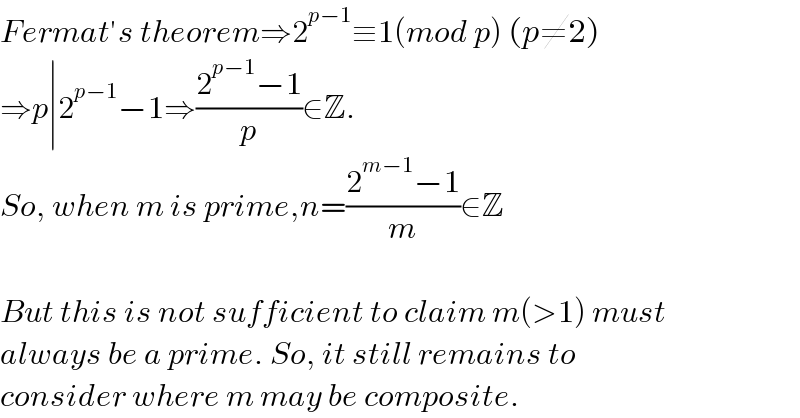
$${Fermat}'{s}\:{theorem}\Rightarrow\mathrm{2}^{{p}−\mathrm{1}} \equiv\mathrm{1}\left({mod}\:{p}\right)\:\left({p}\neq\mathrm{2}\right) \\ $$$$\Rightarrow{p}\mid\mathrm{2}^{{p}−\mathrm{1}} −\mathrm{1}\Rightarrow\frac{\mathrm{2}^{{p}−\mathrm{1}} −\mathrm{1}}{{p}}\in\mathbb{Z}. \\ $$$${So},\:{when}\:{m}\:{is}\:{prime},{n}=\frac{\mathrm{2}^{{m}−\mathrm{1}} −\mathrm{1}}{{m}}\in\mathbb{Z} \\ $$$$ \\ $$$${But}\:{this}\:{is}\:{not}\:{sufficient}\:{to}\:{claim}\:{m}\left(>\mathrm{1}\right)\:{must} \\ $$$${always}\:{be}\:{a}\:{prime}.\:{So},\:{it}\:{still}\:{remains}\:{to} \\ $$$${consider}\:{where}\:{m}\:{may}\:{be}\:{composite}. \\ $$
Commented by BHOOPENDRA last updated on 25/Sep/24

$${m}=\mathbb{P}\left(\mathrm{2}{k}+\mathrm{1}\right)\:{where}\:{k}\in\:\mathbb{Z}^{+} \:{and}\:{k}\:\geqslant\mathrm{1}\: \\ $$$$\mathbb{P}\:{is}\:{prime}\:\:\mathbb{P}\:\geq\mathrm{3}\left({except}\:\mathrm{1}\right) \\ $$$$\:{we}\:{can}\:{say}\:{that}\:{i}\:{think} \\ $$
Answered by A5T last updated on 25/Sep/24
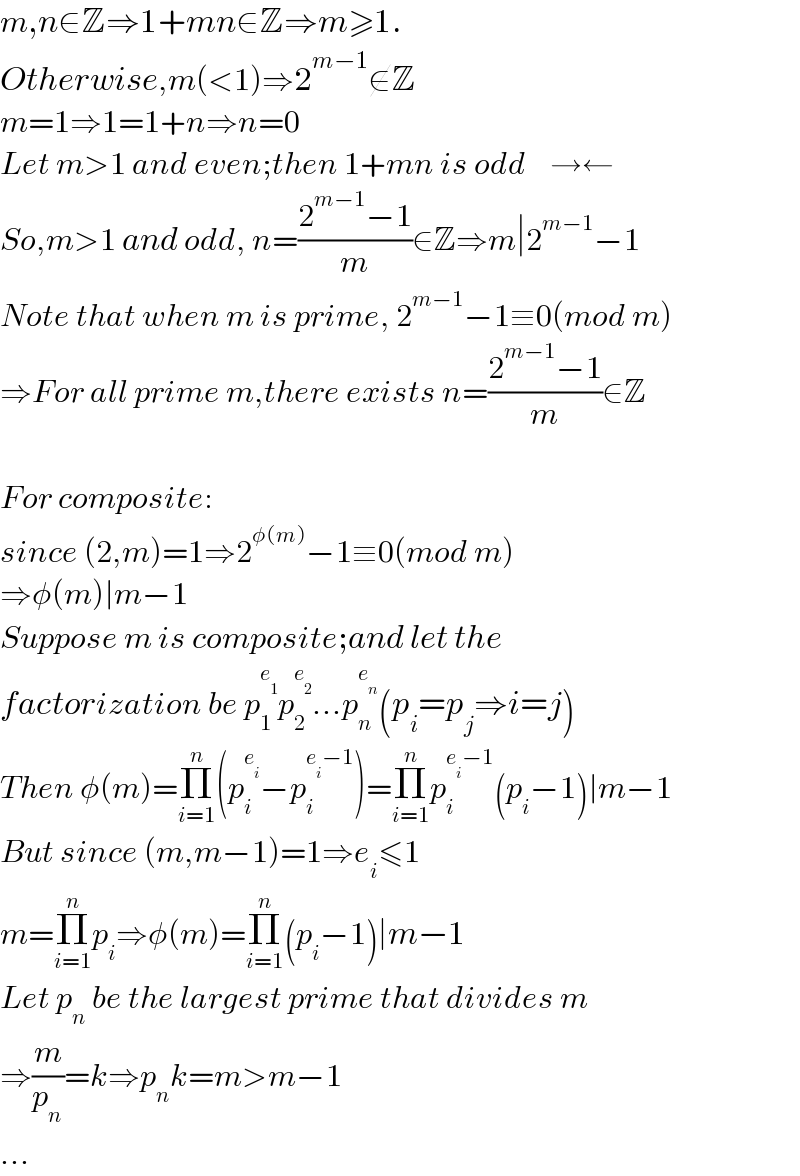
$${m},{n}\in\mathbb{Z}\Rightarrow\mathrm{1}+{mn}\in\mathbb{Z}\Rightarrow{m}\geqslant\mathrm{1}. \\ $$$${Otherwise},{m}\left(<\mathrm{1}\right)\Rightarrow\mathrm{2}^{{m}−\mathrm{1}} \notin\mathbb{Z} \\ $$$${m}=\mathrm{1}\Rightarrow\mathrm{1}=\mathrm{1}+{n}\Rightarrow{n}=\mathrm{0} \\ $$$${Let}\:{m}>\mathrm{1}\:{and}\:{even};{then}\:\mathrm{1}+{mn}\:{is}\:{odd}\:\:\:\:\rightarrow\leftarrow \\ $$$${So},{m}>\mathrm{1}\:{and}\:{odd},\:{n}=\frac{\mathrm{2}^{{m}−\mathrm{1}} −\mathrm{1}}{{m}}\in\mathbb{Z}\Rightarrow{m}\mid\mathrm{2}^{{m}−\mathrm{1}} −\mathrm{1} \\ $$$${Note}\:{that}\:{when}\:{m}\:{is}\:{prime},\:\mathrm{2}^{{m}−\mathrm{1}} −\mathrm{1}\equiv\mathrm{0}\left({mod}\:{m}\right) \\ $$$$\Rightarrow{For}\:{all}\:{prime}\:{m},{there}\:{exists}\:{n}=\frac{\mathrm{2}^{{m}−\mathrm{1}} −\mathrm{1}}{{m}}\in\mathbb{Z} \\ $$$$ \\ $$$${For}\:{composite}: \\ $$$${since}\:\left(\mathrm{2},{m}\right)=\mathrm{1}\Rightarrow\mathrm{2}^{\phi\left({m}\right)} −\mathrm{1}\equiv\mathrm{0}\left({mod}\:{m}\right) \\ $$$$\Rightarrow\phi\left({m}\right)\mid{m}−\mathrm{1} \\ $$$${Suppose}\:{m}\:{is}\:{composite};{and}\:{let}\:{the}\: \\ $$$${factorization}\:{be}\:{p}_{\mathrm{1}} ^{{e}_{\mathrm{1}} } {p}_{\mathrm{2}} ^{{e}_{\mathrm{2}} } ...{p}_{{n}} ^{{e}_{{n}} } \left({p}_{{i}} ={p}_{{j}} \Rightarrow{i}={j}\right) \\ $$$${Then}\:\phi\left({m}\right)=\underset{{i}=\mathrm{1}} {\overset{{n}} {\prod}}\left({p}_{{i}} ^{{e}_{{i}} } −{p}_{{i}} ^{{e}_{{i}} −\mathrm{1}} \right)=\underset{{i}=\mathrm{1}} {\overset{{n}} {\prod}}{p}_{{i}} ^{{e}_{{i}} −\mathrm{1}} \left({p}_{{i}} −\mathrm{1}\right)\mid{m}−\mathrm{1} \\ $$$${But}\:{since}\:\left({m},{m}−\mathrm{1}\right)=\mathrm{1}\Rightarrow{e}_{{i}} \leqslant\mathrm{1} \\ $$$${m}=\underset{{i}=\mathrm{1}} {\overset{{n}} {\prod}}{p}_{{i}} \Rightarrow\phi\left({m}\right)=\underset{{i}=\mathrm{1}} {\overset{{n}} {\prod}}\left({p}_{{i}} −\mathrm{1}\right)\mid{m}−\mathrm{1} \\ $$$${Let}\:{p}_{{n}} \:{be}\:{the}\:{largest}\:{prime}\:{that}\:{divides}\:{m} \\ $$$$\Rightarrow\frac{{m}}{{p}_{{n}} }={k}\Rightarrow{p}_{{n}} {k}={m}>{m}−\mathrm{1} \\ $$$$... \\ $$
Commented by A5T last updated on 25/Sep/24

$$\mathrm{2}^{\phi\left({m}\right)} \equiv\mathrm{1}\left({mod}\:{m}\right)\:{since}\:{gcd}\left(\mathrm{2},{m}\right)=\mathrm{1} \\ $$$${But}\:{we}\:{know}\:{that}\:{m}\mid\mathrm{2}^{{m}−\mathrm{1}} −\mathrm{1},{that}\:{is}, \\ $$$$\mathrm{2}^{{m}−\mathrm{1}} \equiv\mathrm{1}\left({mod}\:{m}\right) \\ $$$${Since}\:\phi\left({m}\right)\leqslant{m}−\mathrm{1};\:{it}\:{follows}\:{that}\:\phi\left({m}\right)\:{must} \\ $$$${divide}\:{m}−\mathrm{1}\:{from}\:{Lagrange}'{s}\:{theorem}. \\ $$
Commented by BHOOPENDRA last updated on 25/Sep/24
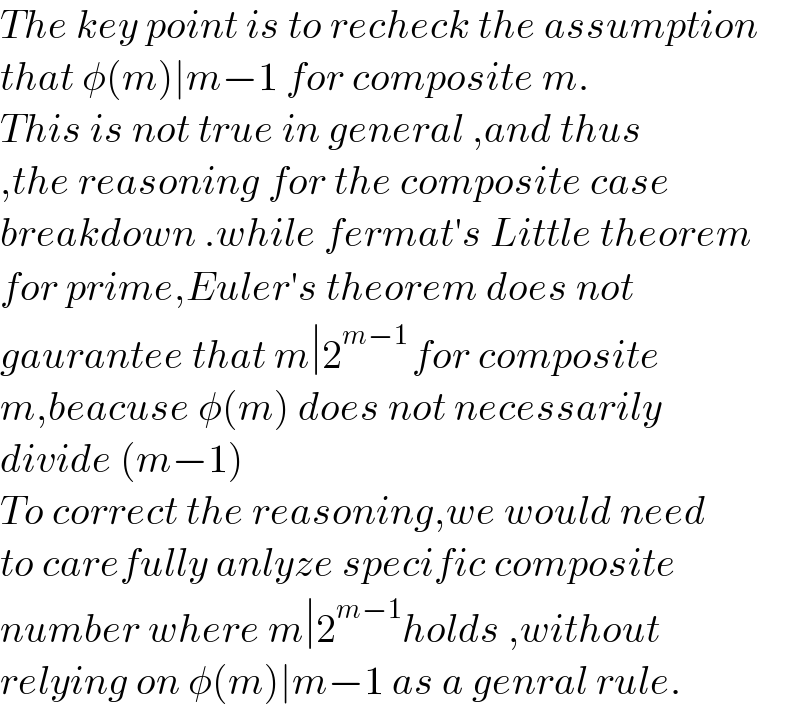
$${The}\:{key}\:{point}\:{is}\:{to}\:{recheck}\:{the}\:{assumption} \\ $$$${that}\:\phi\left({m}\right)\mid{m}−\mathrm{1}\:{for}\:{composite}\:{m}. \\ $$$${This}\:{is}\:{not}\:{true}\:{in}\:{general}\:,{and}\:{thus} \\ $$$$,{the}\:{reasoning}\:{for}\:{the}\:{composite}\:{case} \\ $$$${breakdown}\:.{while}\:{fermat}'{s}\:{Little}\:{theorem} \\ $$$${for}\:{prime},{Euler}'{s}\:{theorem}\:{does}\:{not} \\ $$$${gaurantee}\:{that}\:{m}\mid\mathrm{2}^{{m}−\mathrm{1}\:} {for}\:{composite} \\ $$$${m},{beacuse}\:\phi\left({m}\right)\:{does}\:{not}\:{necessarily} \\ $$$${divide}\:\left({m}−\mathrm{1}\right) \\ $$$${To}\:{correct}\:{the}\:{reasoning},{we}\:{would}\:{need} \\ $$$${to}\:{carefully}\:{anlyze}\:{specific}\:{composite} \\ $$$${number}\:{where}\:{m}\mid\mathrm{2}^{{m}−\mathrm{1}} {holds}\:,{without} \\ $$$${relying}\:{on}\:\phi\left({m}\right)\mid{m}−\mathrm{1}\:{as}\:{a}\:{genral}\:{rule}. \\ $$
